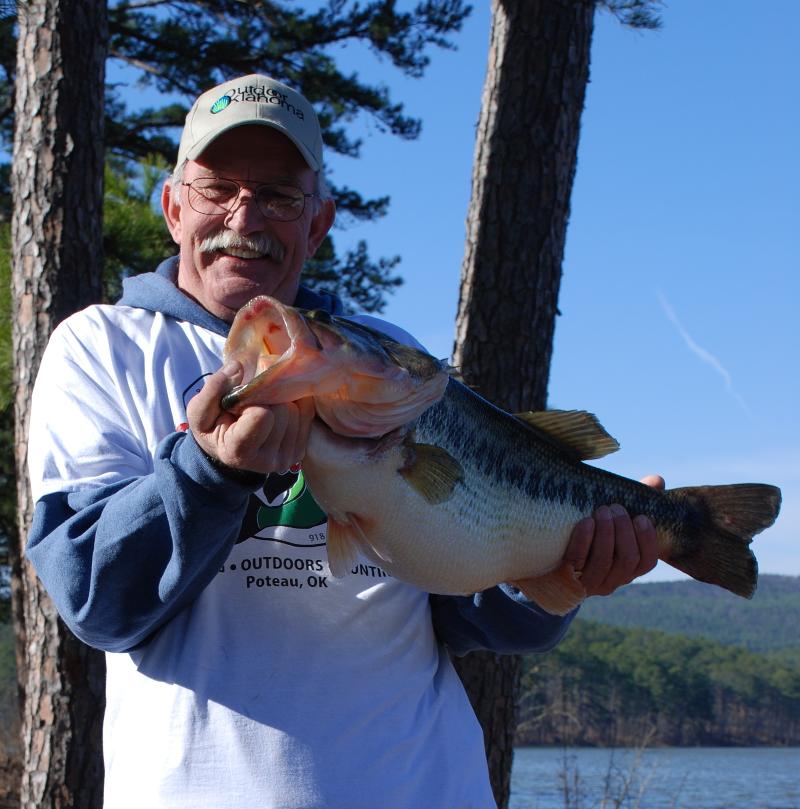
March 14, 2013
A service of the Oklahoma Department of Wildlife Conservation
Cedar Lake produces second state record largemouth bass in under 12 months
Cedar Lake in southeast Oklahoma has produced its second state record largemouth bass in less than one year. The new record was caught Wednesday, March 13 by Dale Miller of Panama, Okla., and weighed 14 lbs. 13.7 oz.
Miller caught the bass at 11:30 a.m. Wednesday on a Hawg Hunter Bait Co. rod set up with an Abu Garcia Revo reel and an Alabama rig. The fish measured 26 1/8 inches in length and 23 inches in girth.
"Last month, I bought a fishing license, and this month I have the state record for the largemouth bass," Miller said.
Miller said when the fish first hit his line and he set the hook, he called for help from his brother, Vonnie, who was fishing with him. He said Vonnie questioned whether there was really a fish on the line.
Miller said they "both about passed out" when they saw the size of the fish. Using their own scales, they weighed the fish, then stopped fishing and began the process of contacting the Oklahoma Department of Wildlife Conservation to determine if it would officially certify as a state record.
Miller's fish breaks a state record set less than a year ago on Cedar Lake when Benny Williams, Jr. of Poteau reeled in a 14 lbs. 12.3 oz. largemouth on March 23.
"Catching the state record largemouth bass in Oklahoma is a huge deal, but it's even more significant that the state record largemouth has now been caught two springs in a row in less than 12 months' time from the same lake," said Barry Bolton, chief of fisheries for the Oklahoma Department of Wildlife Conservation. "It speaks to the quality of fishing we have in our state. It speaks to our Florida largemouth bass stocking program. And it speaks to our state's anglers."
In addition to being the second state record from Cedar Lake, the fish adds to a tremendous run of recent Oklahoma bass fishing headlines, including the hosting of the Bassmaster Classic at Grand Lake last month and two 40-plus-pound tournament stringers reeled in during successive recent weekends at Arbuckle Lake.
The last two state record largemouth bass as well as several from the state's Top 20 Largemouth Bass List have been caught in the southern and southeast regions of the state. Fish are cold-blooded, so their metabolisms work faster in warmer conditions and they grow more rapidly. Lakes in the southeast region of the state tend to warm up earlier and cool off later in the year than in other regions, which affords these fish a longer growing season.
According to Gene Gilliland, assistant chief of fisheries for the Wildlife Department, Cedar Lake has been known to produce big largemouth bass for anglers in recent years - not only because of its southeastern location, but also because it has a history of receiving Florida strain largemouth bass through the state's stocking program.
"They grow pretty fast down in that part of the state due to the long growing season," Gilliland said. "Cedar Lake has produced several double-digit fish in the last five years. The U.S. Forest Service played a role in the success story when they renovated Cedar Lake several years ago. This renovation created a "new lake environment" that along with the Florida-strain genetics, long growing season, good habitat and abundant forage has led Cedar Lake to become an outstanding bass fishery."














